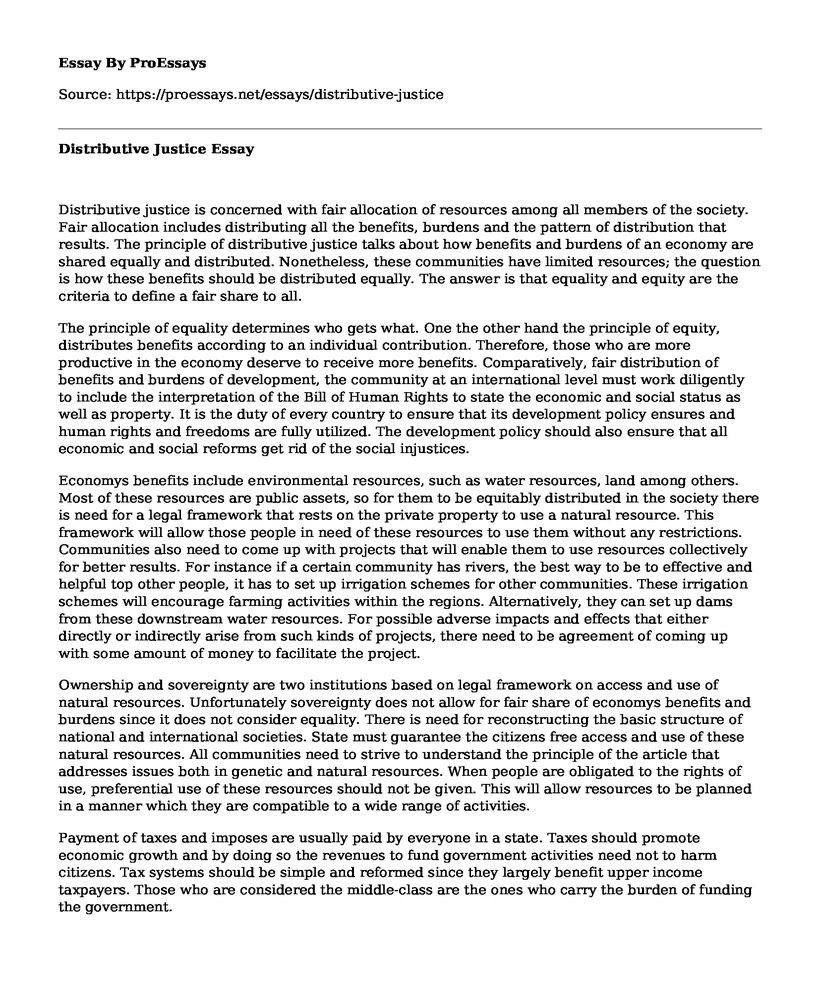Distributive justice is concerned with fair allocation of resources among all members of the society. Fair allocation includes distributing all the benefits, burdens and the pattern of distribution that results. The principle of distributive justice talks about how benefits and burdens of an economy are shared equally and distributed. Nonetheless, these communities have limited resources; the question is how these benefits should be distributed equally. The answer is that equality and equity are the criteria to define a fair share to all.
The principle of equality determines who gets what. One the other hand the principle of equity, distributes benefits according to an individual contribution. Therefore, those who are more productive in the economy deserve to receive more benefits. Comparatively, fair distribution of benefits and burdens of development, the community at an international level must work diligently to include the interpretation of the Bill of Human Rights to state the economic and social status as well as property. It is the duty of every country to ensure that its development policy ensures and human rights and freedoms are fully utilized. The development policy should also ensure that all economic and social reforms get rid of the social injustices.
Economys benefits include environmental resources, such as water resources, land among others. Most of these resources are public assets, so for them to be equitably distributed in the society there is need for a legal framework that rests on the private property to use a natural resource. This framework will allow those people in need of these resources to use them without any restrictions. Communities also need to come up with projects that will enable them to use resources collectively for better results. For instance if a certain community has rivers, the best way to be to effective and helpful top other people, it has to set up irrigation schemes for other communities. These irrigation schemes will encourage farming activities within the regions. Alternatively, they can set up dams from these downstream water resources. For possible adverse impacts and effects that either directly or indirectly arise from such kinds of projects, there need to be agreement of coming up with some amount of money to facilitate the project.
Ownership and sovereignty are two institutions based on legal framework on access and use of natural resources. Unfortunately sovereignty does not allow for fair share of economys benefits and burdens since it does not consider equality. There is need for reconstructing the basic structure of national and international societies. State must guarantee the citizens free access and use of these natural resources. All communities need to strive to understand the principle of the article that addresses issues both in genetic and natural resources. When people are obligated to the rights of use, preferential use of these resources should not be given. This will allow resources to be planned in a manner which they are compatible to a wide range of activities.
Payment of taxes and imposes are usually paid by everyone in a state. Taxes should promote economic growth and by doing so the revenues to fund government activities need not to harm citizens. Tax systems should be simple and reformed since they largely benefit upper income taxpayers. Those who are considered the middle-class are the ones who carry the burden of funding the government.
The findings of the article on equality, non-discrimination and fair distribution of the benefits of development are that positive and negative concepts of the principle of equality are not the same. The positive concept states that everyone needs equal treatment while the negative concept argues that the principle should allow differences in treatment.
Cite this page
Distributive Justice. (2021, Mar 09). Retrieved from https://proessays.net/essays/distributive-justice
If you are the original author of this essay and no longer wish to have it published on the ProEssays website, please click below to request its removal:
- Paper Example on Annexation of the State of Texas
- Essay Sample on Developmental Milestones: Birth to Kindergarten
- Essay Sample on Reforms Needed in the Policing Institution
- Impacts of Divorce on Family: Data-Backed Analysis - Essay Sample
- Parental Socialization: Gender Beliefs and Kids' Behaviours - Essay Sample
- Rice Exporting: Analysing Indian Competitors & Their Credit-Based Sales - Essay Sample
- Literary Analysis of Ramayan of Valmiki - Free Paper







